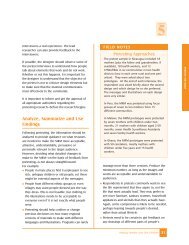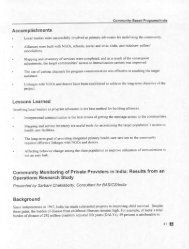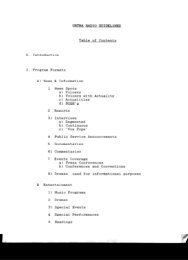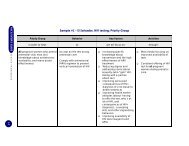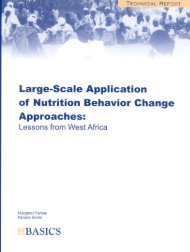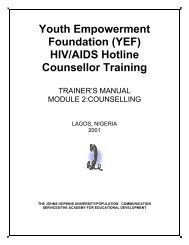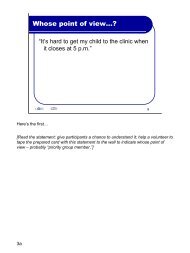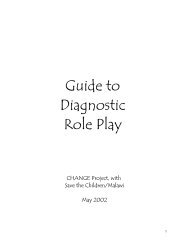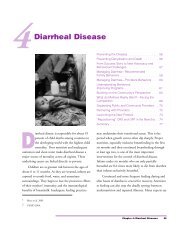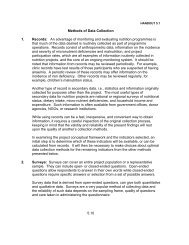MODULE TWO: COUNSELLING - FHI 360 Center for Global Health ...
MODULE TWO: COUNSELLING - FHI 360 Center for Global Health ...
MODULE TWO: COUNSELLING - FHI 360 Center for Global Health ...
Create successful ePaper yourself
Turn your PDF publications into a flip-book with our unique Google optimized e-Paper software.
•Questioning and Probing<br />
Asking questions in a way that encourages callers to express their feelings and<br />
share in<strong>for</strong>mation about their situation. This is accomplished through asking<br />
open-ended questions and probing <strong>for</strong> more in<strong>for</strong>mation when a superficial<br />
answer is not enough.<br />
What can we learn through questions?<br />
*The general situation<br />
What did you want to talk about?<br />
*The facts<br />
What happened?<br />
* Feelings How did you feel?<br />
* Reasons What made you do that?<br />
* Specifics Please could you explain that more?<br />
*Open-ended questions are questions that require more than a one-word<br />
answer. They usually begin with words such as “How?”, “What?” or “Why?”.<br />
Probing is necessary when the counsellors needs more in<strong>for</strong>mation about a<br />
person’s feelings or situation.<br />
Following are some helpful probing phrases:<br />
“Can you tell me more about that?”<br />
“What happened after that?”<br />
“Please describe the symptoms”<br />
“Yes, Explain how you felt ”<br />
*Close-ended questions usually require one or two word answer, are helpful to<br />
clarify or confirm issues or statements that the counsellor needs specific<br />
in<strong>for</strong>mation.<br />
Example: How old is your friend? 19<br />
Is your friend with you now? Yes<br />
Are you still very afraid? Not so much…..<br />
How far away are you from the clinic? About 5 miles<br />
The counsellors use a combination of open-ended questions and some closeended<br />
questions when they need to probe about two things:<br />
1) The caller’s experiences or “story”; and<br />
2) The caller’s feelings.<br />
Callers may have trouble expressing their feelings and may need help from<br />
counsellors to verbalise them. The handout Focus on Feelings provides a list of<br />
words that counsellors can use to: 1) Help callers express their feelings; and<br />
2) Acknowledge feelings once they are expressed.<br />
Session 4 – Pg. 5



